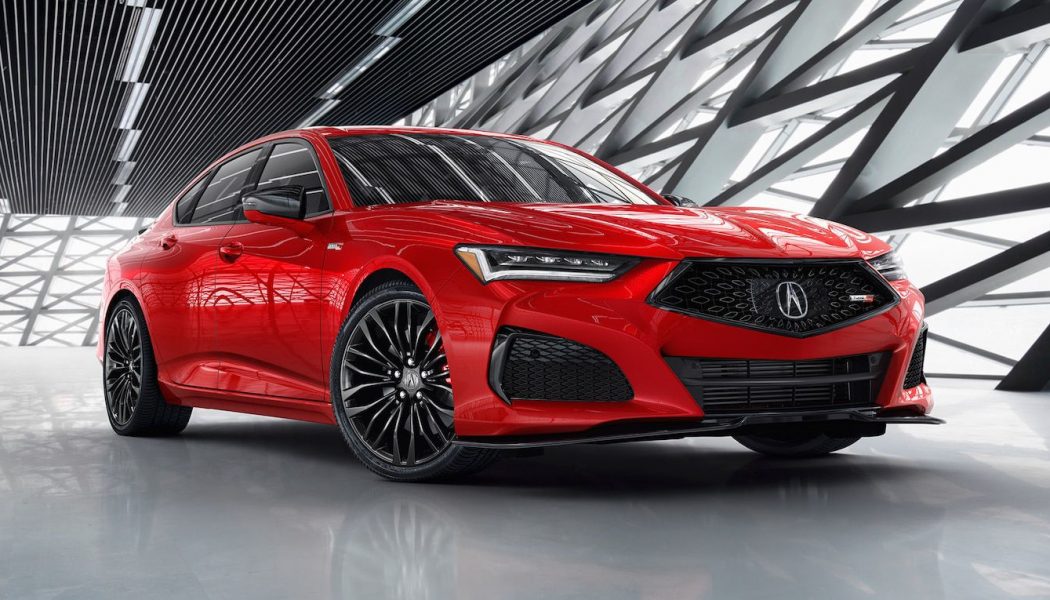Honda is moving its Acura luxury brand upmarket by highlighting its performance chops. It is a strategy that began with the return of the NSX sports car at the 2015 North American International Auto Show and has shown more recent success with the arrival of new Acura RDX in 2018. The compact crossover’s additional athleticism came at a cost, though, and the latest RDX saw its price jump $3,000 relative to that of its predecessor. Acura is following the same plan with its 2021 TLX that goes on sale at the end of September.
And yes, the sports sedan’s price takes a big jump, with the entry-level TLX 2.0T and its turbocharged four-cylinder engine starting at $38,525. That is $1,300 more than the outgoing TLX with its optional V-6. The base 2020 TLX with its 2.4-liter four-cylinder, meanwhile, wears a sticker price of $34,025. It’s not all bad news, though, as even with all-wheel drive, the 2021 TLX is priced slightly below physically smaller competitors such as the BMW 3 Series, Audi A4, and Mercedes-Benz C-Class.
So, what gives?
The 2021 TLX is the second generation of Acura’s sports sedan and it is a whole new animal. It all started with a blank sheet of paper, giving Acura the freedom to dictate dimensions from scratch to develop a car for sedan enthusiasts with the kind of standout proportions they seek, Jon Ikeda, vice president and Acura brand officer of American Honda Motor Co., said.
Ikeda knows what he is talking about: he is a sedan guy himself and spent much of his career as a designer. This means he knows the impact of giving the TLX a dash-to-axle proportion that is 7.8 inches longer than the outgoing model. Overall, the car is longer, wider, and lower, harkening back to the Legend and Integra from Acura’s early days. The long hood and short overhangs belie the fact the new TLX is a front-wheel-drive car. The goal was the seven-second knockout: an immediate good first impression based on the design, TLX product planner Jonathon Rivers said.
The 2021 TLX rides on a new architecture developed for the model and the return of the performance-minded Type S sub-brand. Acura executives insist the body structure and chassis are exclusive to the TLX and the car does not share parts with other Honda or Acura models. Ikeda does not rule out future derivatives using the platform.
The new bones made it possible to switch to a double-wishbone front suspension and five-link rear—performance underpinnings that marked the original Acura vehicles.
Powertrain Lineup Changed
And the engine lineup is completely revamped. Gone is the outgoing TLX’s 206-hp 2.4-liter four-cylinder. In its place is a new 272-hp turbocharged 2.0-liter. It is a small but powerful replacement with output on par with that of the 2020 TLX’s optional 290-hp 3.5-liter V-6. A 355-hp turbocharged 3.0-liter V-6 powers the TLX Type S.
Both engines mate to a 10-speed automatic transmission and work with the latest iteration of Acura’s so-called Super-Handling All-Wheel Drive, which is standard on the Type S and a $2,000 option on all other trims.
Acura TLX Type S Coming Next Spring
The Type S launches in the spring of 2021 with a starting price of about $52,000. There are no plans to give the TLX an electric motor or two, either.
While Acura is discontinuing the RLX, the TLX will not become the new flagship of the brand—that honor stays with the NSX, Ikeda said. Still, the TLX’s growth spurt means there’s still a place for the smaller ILX and perhaps even a new entry-level car.
Opting for the TLX Type S adds quad exhaust tubes, a front splitter, and a rear diffuser to the sedan’s exterior styling. Black matte accents replace chrome ones, while 20-inch wheels come standard. The dubs are wrapped in all-season tires, though stickier summer rubber is available, as well. Type S models also benefit from an additional drive mode—Sport+—while stopping power comes courtesy of Brembo. Adaptive dampers are standard equipment.
“With the NSX and [TLX] Type S, people will view Acura differently,” Ikeda said.










